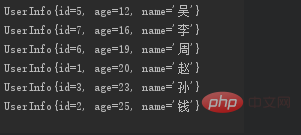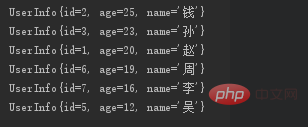
Create a new UserInfo object here to test lambda expression sorting. The properties are as follows:
public class UserInfo {
private int id;
private int age;
private String name;
public UserInfo(int id, int age, String name) {
this.id = id;
this.age = age;
this.name = name;
}
public int getId() {
return id;
}
public void setId(int id) {
this.id = id;
}
public int getAge() {
return age;
}
public void setAge(int age) {
this.age = age;
}
public String getName() {
return name;
}测试
public void setName(String name) {
this.name = name;
}Recommended related video tutorials: java learning
Start creating data, and sort it in positive order by age during the test:
public static void main(String[] args) {
UserInfo user1 = new UserInfo(1, 20, "赵");
UserInfo user2 = new UserInfo(2, 25, "钱");
UserInfo user3 = new UserInfo(3, 23, "孙");
UserInfo user4 = new UserInfo(7, 16, "李");
UserInfo user5 = new UserInfo(6, 19, "周");
UserInfo user6 = new UserInfo(5, 12, "吴");
List<UserInfo> userInfoList = new ArrayList<>();
userInfoList.add(user2);
userInfoList.add(user1);
userInfoList.add(user3);
userInfoList.add(user4);
userInfoList.add(user5);
userInfoList.add(user6);
//使用lambda表达式对age大小正序排序
userInfoList = userInfoList.stream().sorted(Comparator.comparing(UserInfo::getAge))
.collect(Collectors.toList());
for (UserInfo userInfo : userInfoList) {
System.out.println(userInfo.toString());
}
}The output results are as follows:

The test is sorted in reverse order by age. :
public static void main(String[] args) {
UserInfo user1 = new UserInfo(1, 20, "赵");
UserInfo user2 = new UserInfo(2, 25, "钱");
UserInfo user3 = new UserInfo(3, 23, "孙");
UserInfo user4 = new UserInfo(7, 16, "李");
UserInfo user5 = new UserInfo(6, 19, "周");
UserInfo user6 = new UserInfo(5, 12, "吴");
List<UserInfo> userInfoList = new ArrayList<>();
userInfoList.add(user2);
userInfoList.add(user1);
userInfoList.add(user3);
userInfoList.add(user4);
userInfoList.add(user5);
userInfoList.add(user6);
//使用lambda表达式对age大小倒序排序,发现就是多加了个reversed()方法
userInfoList = userInfoList.stream().sorted(Comparator.comparing(UserInfo::getAge).
reversed()).collect(Collectors.toList());
for (UserInfo userInfo : userInfoList) {
System.out.println(userInfo.toString());
}
}The output results are as follows:

Summarize the sorting method:
1. Sort according to a certain field in positive order:
userInfoList.stream().sorted(Comparator.comparing(UserInfo::getAge)).collect(Collectors.toList());
2. Sort in reverse order according to a certain field:
userInfoList.stream().sorted(Comparator.comparing(UserInfo::getAge).reversed()).collect(Collectors.toList());
Just adjust the above parameters according to your business.
Recommended related articles and tutorials: Getting started with java
The above is the detailed content of Java uses lambda expression to sort a certain attribute of List object collection. For more information, please follow other related articles on the PHP Chinese website!